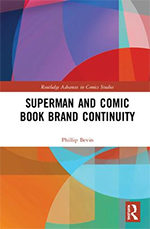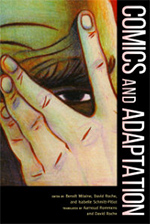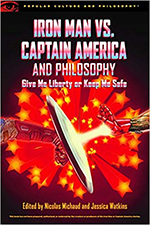Im Monitor werden in unregelmäßigen Abständen aktuelle Publikationen aus den letzten 6 Monaten vorgestellt, die für die Comicforschung relevant sein könnten. Die kurzen Ankündigungstexte dazu stammen von den jeweiligen Verlagsseiten. Haben Sie Anregungen oder Hinweise auf Neuerscheinungen, die übersehen worden sind und hier erwähnt werden sollten? Das Team freut sich über eine Mail an redaktion@comicgesellschaft.de. -> Zu früheren Monitoren.

Superman and Comic Book Brand Continuity
Phillip Bevin
Routledge
166 Seiten
ISBN 978-0-8153-6859-5 (Hardcover)
~£ 92,00
August 2018
Verlagsseite
Superman and Comic Book Brand Continuity traces the development of comic book continuity through the case study of Superman, examining the character’s own evolution across several media, including comics, radio, television, and film. Superman’s relationship with continuity illustrates a key feature of the way in which people in western societies construct stories about themselves. In this respect, the book is a study of narrative and how comic book continuity reflects the way that, in wider western post-enlightenment culture, storytelling shapes the common sense and received wisdoms that influence how we perceive „reality.“ The scope of the analysis extends from Superman’s creation in the late 1930s to the recent films Man of Steel (2013) and Batman v. Superman: Dawn of Justice (2016), as well as the current comic book reboot Rebirth (2016).

Comics and Adaptation
Benoît Mitaine, David Roche und Isabelle Schmitt-Pitiot (Hrsg.)
University Press of Mississippi
240 Seiten
ISBN 978-1-4968-0337-5 (Hardcover)
~$ 70,00
August 2018
Verlagsseite
Both comics studies and adaptation studies have grown separately over the past twenty years. Yet there are few in-depth studies of comic books and adaptations together. Available for the first time in English, this collection pores over the phenomenon of comic books and adaptation, sifting through comics as both sources and results of adaptation. Essays shed light on the many ways adaptation studies inform research on comic books and content adapted from them. Contributors concentrate on fidelity to the source materials, comparative analysis, forms of media, adaptation and myth, adaptation and intertextuality, as well as adaptation and ideology. After an introduction that assesses adaptation studies as a framework, the book examines comics adaptations of literary texts as more than just illustrations of their sources. Essayists then focus on adaptations of comics, often from a transmedia perspective. Case studies analyze both famous and lesser-known American, Belgian, French, Italian, and Spanish comics.

Iron Man vs. Captain America and Philosophy
Nicolas Michaud und Jessica Watkins (Hrsg.)
Open Court
276 Seiten
ISBN 978-0-8126-9976-0 (Softcover)
~$ 19,95
August 2018
Verlagsseite
Iron Man or Captain America? Which one is superior―as a hero, as a role model, or as a personification of American virtue? Philosophers who take different sides come together in Iron Man versus Captain America to debate these issues and arrive at a deeper understanding of the strengths and weaknesses of these iconic characters. The discussion ranges over politics, religion, ethics, psychology, and metaphysics. The book you have in your hands is a little unusual. Often, philosophy and popular culture books explore many aspects of a pop culture phenomenon. This book focuses on one specific question, “Who is better?” You might think that there isn’t much to say on this issue, and we’re sure you have your own opinion already, but comparing Captain America and Iron Man brings out a lot of questions and problems we don’t normally think about.
The reason why these two men in philosophical competition with each other is so important and terrifying isn’t just because they are the good guys, but because they are both our good guys. Let’s be honest, Iron man isn’t exactly a Communist superhero, and Captain America is well Captain America. Tony Stark is the poster boy for capitalism. In fact, Stan Lee created him specifically to see if he could make people love a ragingly selfish capitalist. Captain America was created originally as a kind of propaganda to support our war effort . . . his first issue shows him punching Hitler! BOTH represent key aspects of the United States: Our economic, social philosophy “competition makes things better” and the ideas of patriotism, liberty, and just doing the right thing. When these heroes fight, they’re revealing something we know at the core of our being is both a tremendous strength and a tremendous danger in our society . . . We are at intellectual war with ourselves! And we don’t just mean liberals and conservatives, religious and non-religious, Ford and Chevy. We mean each of us living here in the States embodies a fight between these two men and their philosophies . . . the unsolvable problem of safety vs. freedom.